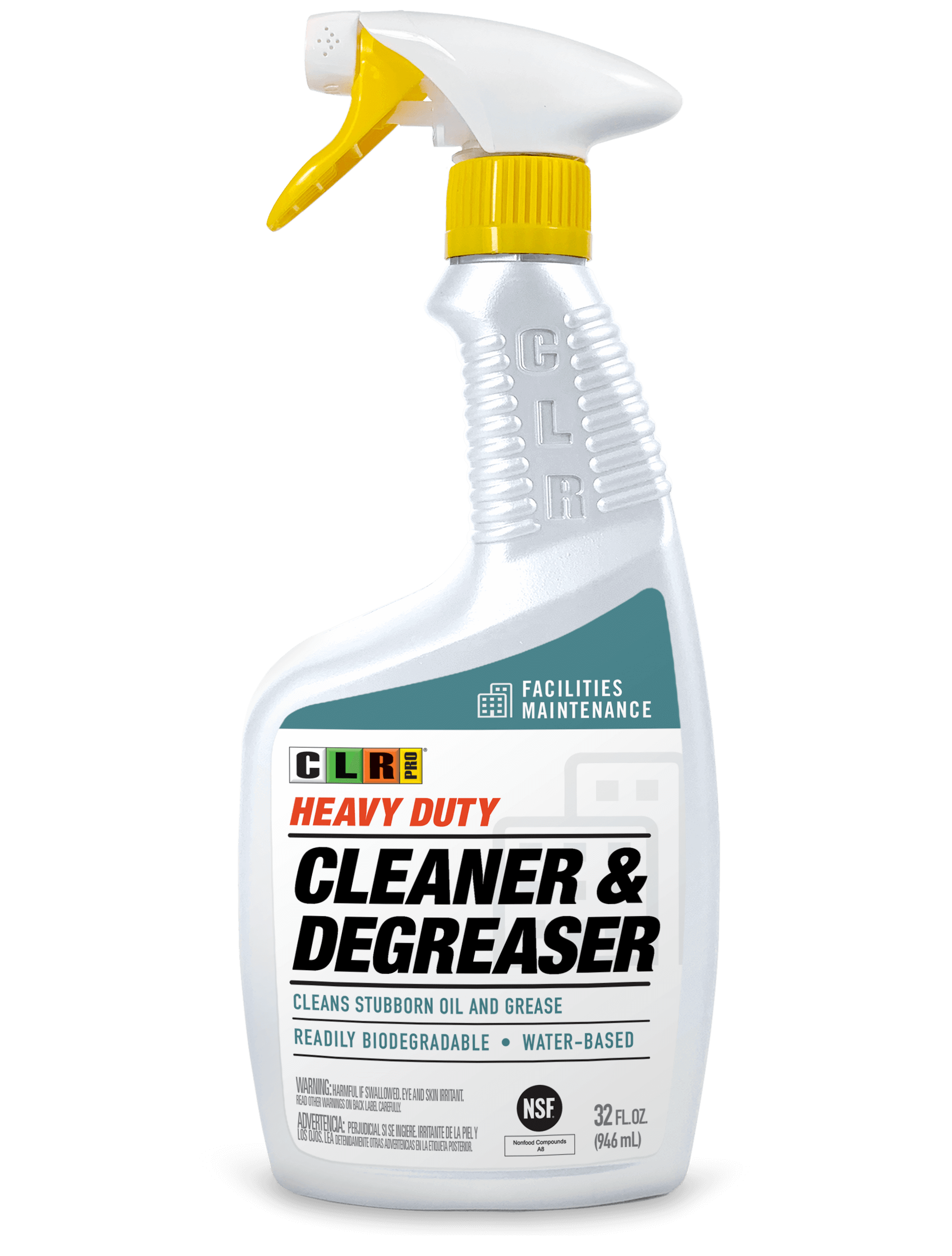
CLR PRO® Heavy Duty Cleaner & Degreaser
Powerful formula that cuts throught fat, oil, grease, food residue and built up grime.
- Industrial-strength formula removes stubborn oil, grease & tar.
- Perfect for cleaning equipment & machinery, trash receptacles, dip tanks, appliances & surface prep tables. Can also be used in pressure washers for cleaning large surfaces.
- Easily lifts oil, grease & tar from concrete, terrazzo, tile, granite, stone floors.
- Water-based degreaser contains no acids, abrasives or petroleum solvents.
- Manufactured in the USA.
- NSF Registered A8
Available In:
For use on these surfaces
- Asphalt
- Blacktop
- Cement
- Range Hood
- Stainless Steel
How to use this product
- Always spot test on an inconspicous area before applying.
- Start by removing loose or heavy deposits.
- Apply product to surface. Dwell time may vary by soil load.
- Use towel or wet sponge to wipe surface clean.
- Rinse with potable water after use.
Featured Video
Product ingredients




| Water | Dilutent: CAS #7732-18-5 |
|
|||
| Dilutent: CAS #7732-18-5. Reverse Osmosis (RO) is a water treatment process that removes contaminants from water by passing the water through a membrane, (filter), where contaminants are filtered out yielding more pure quality water. | |||||
| C9-11 Alcohols Ethoxylated | Surfactant: CAS #68439-46-3. |
|
|||
|
Surfactant: CAS #68439-46-3. It is used in cleaners to modify the surface tension of water, to aid in even spreading and to allow mixing with oil and dirt so that they can be rinsed away. As part of the EPA Safer Choice Program, it has been evaluated and determined to be safer than traditional chemical ingredients. California CPRKA Designated Lists (3) EU Endocrine Disruptors. https://echa.europa.eu/candidate-list-table (16) California NLs. https://oehha.ca.gov/water/notification-levels-chemicals-drinking-water (18) California TACs. https://ww3.arb.ca.gov/toxics/id/taclist.htm (20) California Non-Cancer Hazards. https://oehha.ca.gov/air/general-info/oehha-acute-8-hour-and-chronic-reference-exposure-level-rel-summary |
|||||
| Sodium Metasilicate Pentahydrate | Builder: CAS #6834-92-0 |
|
|||
|
Builder: CAS #6834-92-0. A strong oxidizer. As a component in a chemical degreaser, it reacts with fatty acids (animal grease) to form a soap, which is then rinsed away. As part of the EPA Safer Choice Program, it has been evaluated and determined to be safer than traditional chemical ingredients. California CPRKA Designated Lists (7) Canada PBTs. https://www.canada.ca/en/environment-climate-change/services/canadian-environmental-protection-act-registry/substances-list/domestic.html (9) IARC Carcinogens. https://monographs.iarc.fr/agents-classified-by-the-iarc/ |
|||||
| Sodium Xylene Sulfonate | Coupling Agent: CAS #1300-72-7. |
|
|||
|
Coupling Agent: CAS #1300-72-7. An organic compound that increases the ability of water to dissolve other molecules. It is also found in personal care products as a surfactant, to modify the surface tension of water, to aid in even spreading and to allow mixing with oil and dirt so that they can be rinsed away. As part of the EPA Safer Choice Program, it has been evaluated and determined to be safer than traditional chemical ingredients. California CPRKA Designated Lists (4) IRIS Neurotoxicants. https://cfpub.epa.gov/ncea/iris/search/index.cfm?sys_joint=11 (10) ATSDR Neurotoxicants. https://www.atsdr.cdc.gov/substances/toxorganlisting.asp?sysid=18 (17) California MCLs. https://govt.westlaw.com/calregs/Document/I2810C4E12DCC4B40A16 (18) California TACs. https://ww3.arb.ca.gov/toxics/id/taclist.htm |
|||||
| Ethylenediaminetetracetic Acid Dipotassium Salt Dihydrate | Chelating Agent: CAS #25102-12-9. |
|
|||
| Chelating Agent: CAS #25102-12-9. | |||||






